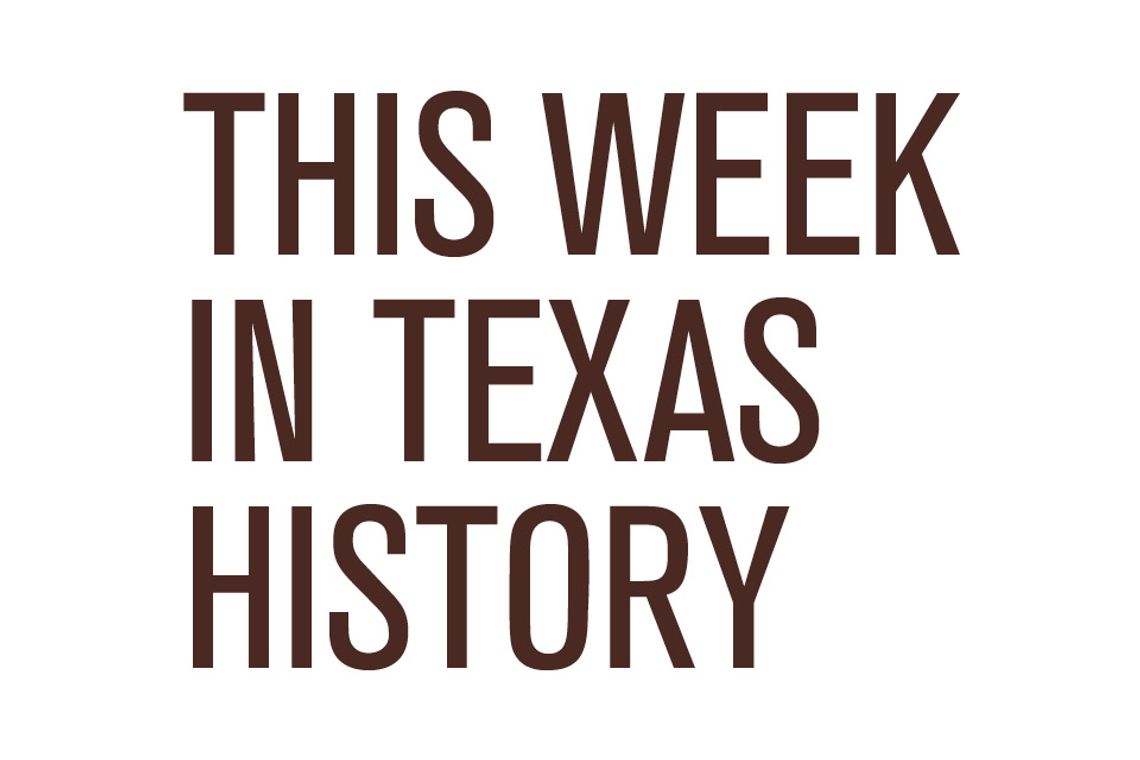Sunset Carson, a star of 1940s westerns, made one of his countless personal appearances on March 29, 1976. But it is safe to say that none of the students and few of the faculty at Denton High School had any idea who he was.
An Okie by birth, Winifred Maurice Harrison moved to the Texas Panhandle in 1928 at the age of eight. It was on the family ranch near Plainview that Mick, the nickname of his youth, learned to ride and rope and practiced jumping on the backs of horses by leaping from hay bales.
Since Harrison never told his life story the same way twice, facts are hard to come by. He claimed to have followed the example of his father and uncle to become an accomplished rodeo performer while still in his teens. He supposedly spent two years on the South American circuit, where he allegedly won back-to-back “Champion All-Around Cowboy” awards in Buenos Aires, Argentina.
Returning to the United States in 1942, Harrison was hired on his dad’s say-so by Tom Mix, the popular screen cowboy, for his Wild West Show. Mix encouraged the ruggedly handsome youth, who had grown to a height of six-foot-six, to give Hollywood a try and even went so far as to open a door or two for him.
That enabled the tall Texan to hit the ground running in Tinsel Town. He landed small parts as “Michael Harrison” in Stage Door Canteen, a wartime morale-booster full of famous faces, and Janie, a comedy about a young woman with a thing for men in uniform.
Those two flicks led to Harrison’s “discovery” by Lou Grey of Republic Pictures. As a prolific producer of B-westerns, the studio was always in the market for actors who looked and talked like real rather than “drug store” cowboys. Harrison not only fit that profile but could stay in the saddle without falling off!
Republic quickly put the promising newcomer under contract. As Harrison recalled in an interview four decades later, executives told him all he had to do was take a two-month acting course and lose his strong Texas drawl.
“They talked me into it,” he joked. “And they didn’t have to try very hard.”
Having met those requirements, he was called into a meeting to pick his new name. “Michael Harrison” was too long for movie marquees and didn’t sound like a cowboy’s handle.
The brain-storming session bogged down until studio boss Herbert Yates stared idly out his office window. Across the street was a large sign advertising “Sunset Motors.” “That’s it!” Yates exclaimed. Moments later, the group agreed on “Carson” – as in “Kit Carson” – for the surname.
“I guess I’m the only cowboy in the business,” wisecracked Sunset Carson in the 1984 interview, “that was named after a used-car lot.”
The latest addition to the Republic “stable” did not start out as a leading man. In his first four pictures, all made in 1944, top billing went to Smiley Burnette who made a career out of playing the comic sidekick for Gene Autry and other western stars.
After Burnette left Republic in June 1944, Sunset got his big chance. Over the next two years, he had the starring role in 11 westerns tailored to his good looks, horsemanship and limited thespian talent.
Sunset attracted an impressive following, especially among children. In a popularity poll of western film stars taken in 1946 by the Motion Picture Herald, moviegoers ranked him eighth.
Then the bottom suddenly fell out. Shortly after a prestigious part in a Roy Rogers “extravaganza” with all the big names in western movies, he showed up drunk at a studio function escorted by an underaged girl.
A furious Herbert Yates told him right then and there he was finished at Republic. By the end of the year, Sunset was out the door and blacklisted at every major studio.
Washed up at 26, Sunset struggled to find work. He made five westerns at a bottom-of-the-barrel studio between 1948 and 1950. The outcast was not seen again on the silver screen for more than 20 years and for the final time in the 1985 turkey Alien Outlaw that was marketed as a sci-fi western.
Personal appearances of every description were his bread and butter. He did enjoy something of a short-lived comeback in the early 1980s as the host of the public television series “Six-Gun Heroes” that showed classic westerns of the B variety.
In the meantime, just staying alive was a challenge for Sunset. In 1979 a black widow spider bite almost proved fatal. He came even closer to dying the next year from abdominal cancer, but a surgeon saved his life.
However, the Grim Reaper could be kept at bay for only so long. Sunset Carson passed away in 1990 at his home in Reno, Nevada with his fifth wife by his side. He was 69 and a self-destructive has-been for the past 44 years.
Bartee’s book “Texas Entertainers: Lone Stars in Profile” is full of actors, singers and writers all Texans! Order your signed copy by mailing a check for $26.30 to Bartee Haile, P.O. Box 130011, Spring, TX 77393.










